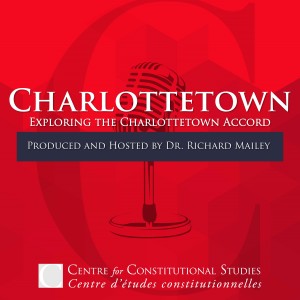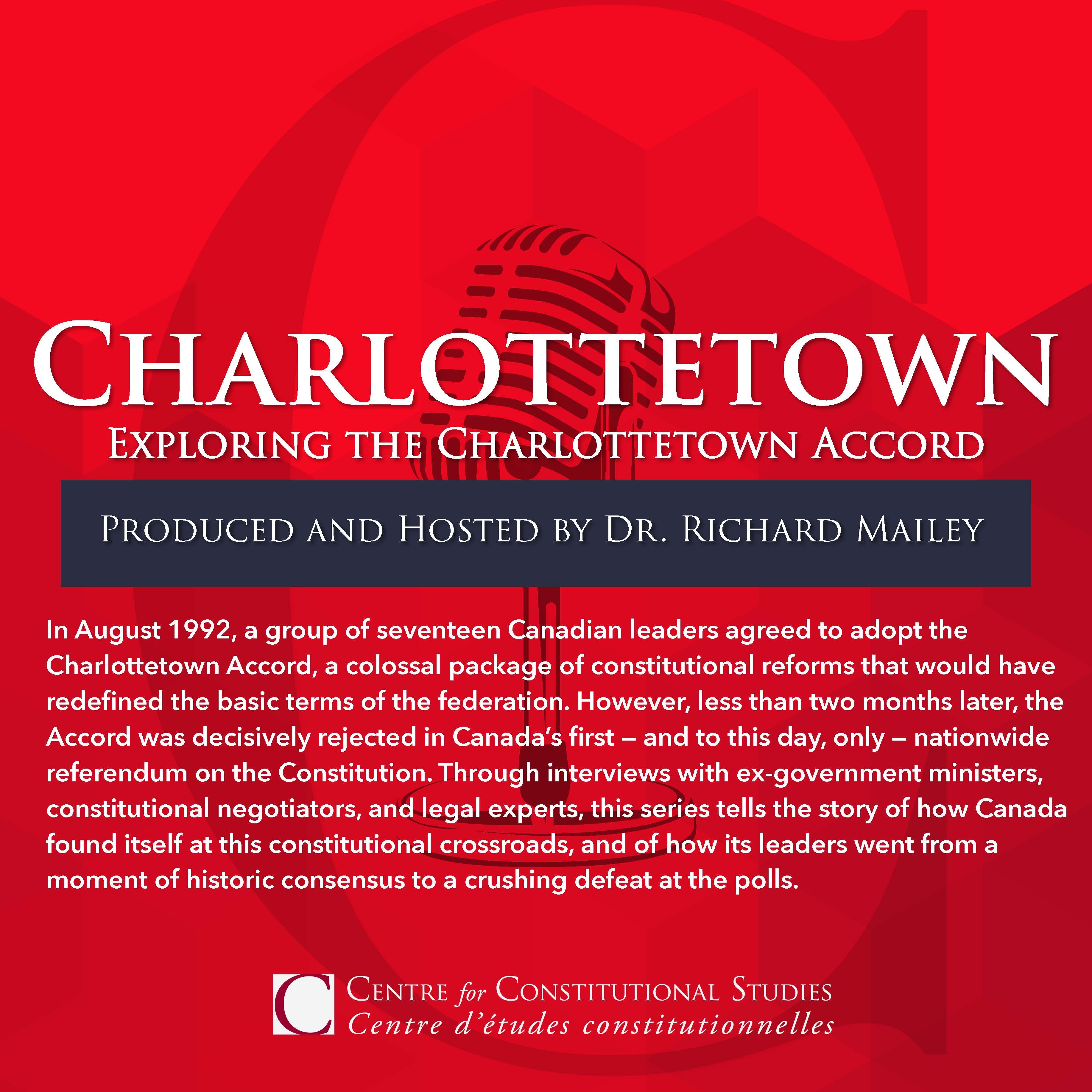This series is produced by the Centre for Constitutional Studies, which is located at the University of Alberta in Edmonton on Treaty 6 territory. The Centre acknowledges and honours the ancestors, traditions, and the spirit that first drew Indigenous peoples — the Cree, Blackfoot, Metis, Nakota Sioux, Iroquois, Dene, Salteaux, Inuit and then settlers — to this gathering place. The Centre, the University, and I enjoy the benefits of Treaty, and the Centre recognizes that land acknowledgement is only a very small step in recognizing and upholding Treaty.
Charlottetown
In August 1992, a group of seventeen Canadian leaders agreed to adopt the Charlottetown Accord, a colossal package of constitutional reforms that would have redefined the basic terms of the federation. However, less than two months later, the Accord was decisively rejected in Canada’s first — and to this day, only — nationwide referendum on the Constitution. Through interviews with ex-government ministers, constitutional negotiators, and legal experts, this series tells the story of how Canada found itself at this constitutional crossroads, and of how Canada’s leaders went from a moment of historic consensus to a crushing defeat at the polls. Series Credits: Created and Hosted by Richard Mailey Produced by Mike Contos & Richard Mailey Music by Richard Mailey
Episodes

Tuesday Mar 15, 2022
Tuesday Mar 15, 2022
In November 1981, Prime Minister Pierre Trudeau and 9 provincial premiers approved an extensive package of constitutional reforms without the consent of Quebec, setting Canada up for more than a decade of political wrangling over its Constitution.
This series is produced by the Centre for Constitutional Studies, which is located at the University of Alberta in Edmonton on Treaty 6 territory. The Centre acknowledges and honours the ancestors, traditions, and the spirit that first drew Indigenous peoples — the Cree, Blackfoot, Metis, Nakota Sioux, Iroquois, Dene, Salteaux, Inuit and then settlers — to this gathering place. The Centre, the University, and I enjoy the benefits of Treaty, and the Centre recognizes that land acknowledgement is only a very small step in recognizing and upholding Treaty.

Wednesday Mar 23, 2022
Wednesday Mar 23, 2022
The election of Brian Mulroney ushers in a new era of constitutional politics in Canada, but Canadians across the political spectrum take issue with his efforts to get Quebec’s signature on the Constitution.
This series is produced by the Centre for Constitutional Studies, which is located at the University of Alberta in Edmonton on Treaty 6 territory. The Centre acknowledges and honours the ancestors, traditions, and the spirit that first drew Indigenous peoples — the Cree, Blackfoot, Metis, Nakota Sioux, Iroquois, Dene, Salteaux, Inuit and then settlers — to this gathering place. The Centre, the University, and I enjoy the benefits of Treaty, and the Centre recognizes that land acknowledgement is only a very small step in recognizing and upholding Treaty.

Wednesday Mar 30, 2022
Wednesday Mar 30, 2022
The failure of the Meech Lake Accord puts the brakes on Mulroney’s Quebec-centric constitutional mission. To regroup, Mulroney launches an extraordinary series of public consultations to discover what, exactly, Canadians want from their Constitution.
This series is produced by the Centre for Constitutional Studies, which is located at the University of Alberta in Edmonton on Treaty 6 territory. The Centre acknowledges and honours the ancestors, traditions, and the spirit that first drew Indigenous peoples — the Cree, Blackfoot, Metis, Nakota Sioux, Iroquois, Dene, Salteaux, Inuit and then settlers — to this gathering place. The Centre, the University, and I enjoy the benefits of Treaty, and the Centre recognizes that land acknowledgement is only a very small step in recognizing and upholding Treaty.

Wednesday Apr 06, 2022
Wednesday Apr 06, 2022
In March 1992, Canada’s leaders return to the negotiating table to try and achieve a new constitutional consensus. Can they finally find a settlement that reconciles their seemingly conflicting constitutional visions?
This series is produced by the Centre for Constitutional Studies, which is located at the University of Alberta in Edmonton on Treaty 6 territory. The Centre acknowledges and honours the ancestors, traditions, and the spirit that first drew Indigenous peoples — the Cree, Blackfoot, Metis, Nakota Sioux, Iroquois, Dene, Salteaux, Inuit and then settlers — to this gathering place. The Centre, the University, and I enjoy the benefits of Treaty, and the Centre recognizes that land acknowledgement is only a very small step in recognizing and upholding Treaty.

Wednesday Apr 13, 2022
Wednesday Apr 13, 2022
Having reached a historic consensus at Charlottetown, PEI, Canada’s leaders set about selling their reforms to the Canadian public, culminating in Canada’s first (and still only) constitutional referendum on October 26, 1992.
This series is produced by the Centre for Constitutional Studies, which is located at the University of Alberta in Edmonton on Treaty 6 territory. The Centre acknowledges and honours the ancestors, traditions, and the spirit that first drew Indigenous peoples — the Cree, Blackfoot, Metis, Nakota Sioux, Iroquois, Dene, Salteaux, Inuit and then settlers — to this gathering place. The Centre, the University, and I enjoy the benefits of Treaty, and the Centre recognizes that land acknowledgement is only a very small step in recognizing and upholding Treaty.

Charlottetown
In August 1992, a group of seventeen Canadian leaders agreed to adopt the Charlottetown Accord, a colossal package of constitutional reforms that would have redefined the basic terms of the federation. However, less than two months later, the Accord was decisively rejected in Canada’s first — and to this day, only — nationwide referendum on the Constitution. Through interviews with ex-government ministers, constitutional negotiators, and legal experts, this series tells the story of how Canada found itself at this constitutional crossroads, and of how Canada’s leaders went from a moment of historic consensus to a crushing defeat at the polls.







